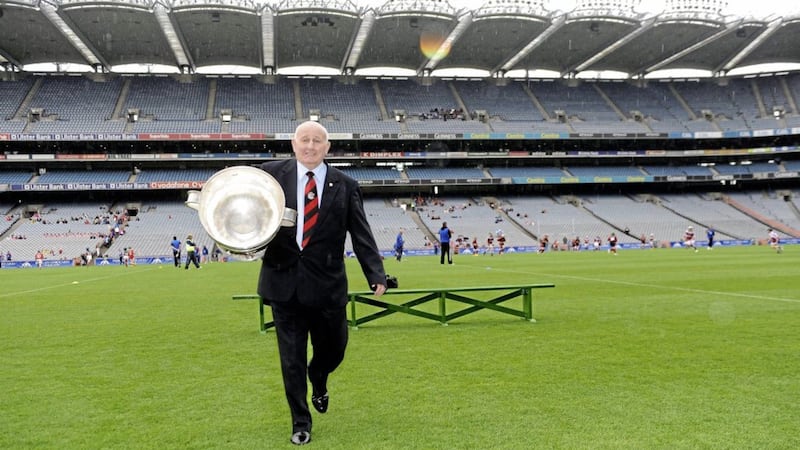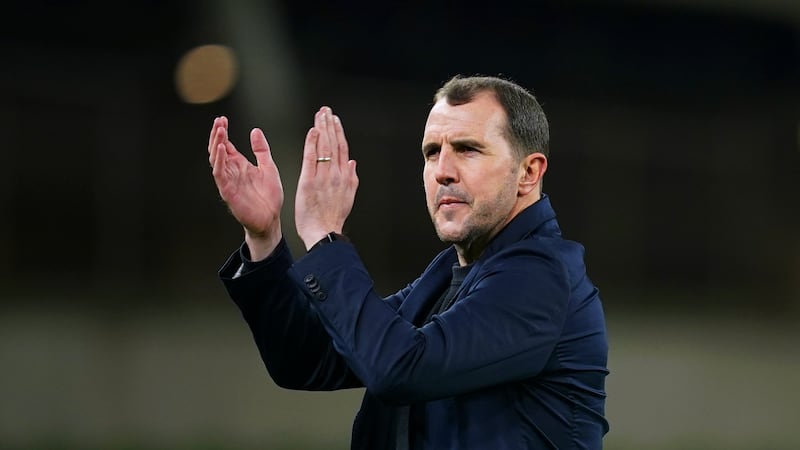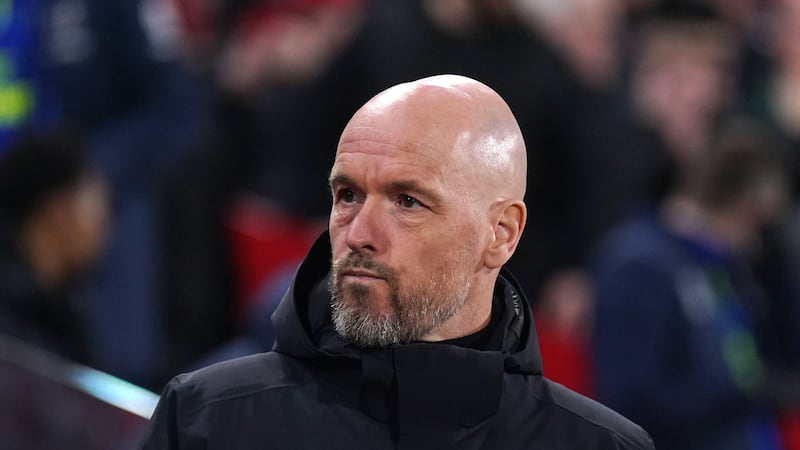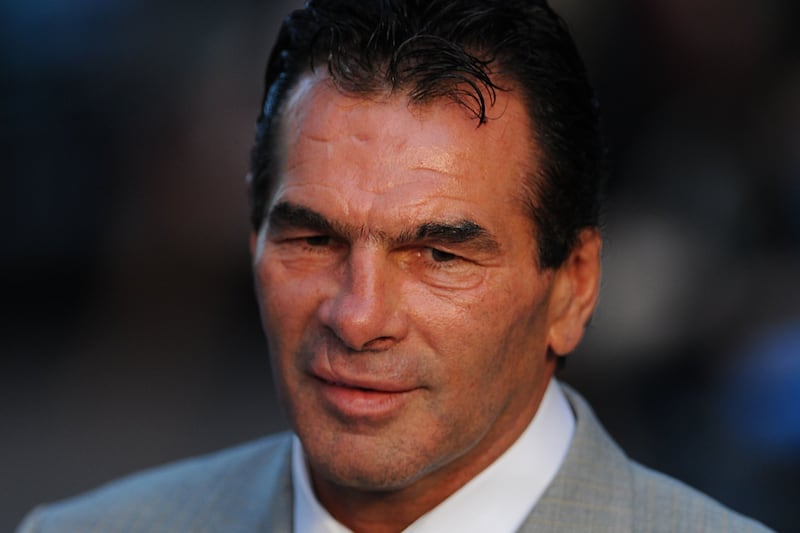IT’S 63 years on but Paddy Doherty can still hear the shouts, still see the faces taunting him from the sideline. June 15, 1958 and after the guts of a year in exile, finally he was back in red and black.
The renewal of Ulster Championship rivalries, another sunny Sunday, the familiar feel of Pairc Esler beneath his boots - this was the moment ‘Paddy Mo’ had been waiting for.
Those who had made the long trip from the hills of Donegal to Newry had more than just the game on their minds though, with plenty quick to remind the Ballykinlar bricklayer just why he had been missing in action for the previous summer’s county campaign.
“Here Paddy,” they shouted, “you must be tired after playing yesterday as well.”
It raised a smile then and, just a couple of weeks after celebrating his 87th birthday, Doherty chuckles down the line again, momentarily transported back to bygone days, a lifetime away from the strangeness of a year largely spent shielding from the outside world due to the Covid-19 pandemic.
You could lose hours chatting through the career of a man whose sledgehammer left foot propelled Down to three All-Ireland titles during the swinging ’60s. On this occasion, though, we’re talking solely about ‘The Ban’ and - as the 50th anniversary of its abolition looms – why he was glad to see the back of it.
Growing up in Marian Park, a stone’s throw from the British army camp in Ballykinlar, he would’ve played anything going. Gaelic football always came first, but his talent soon saw Doherty in demand among local soccer circles.
And, like so many young men at that time, he was only too happy to have something to do on a Saturday afternoon.
‘The Ban’ – the rule, introduced in 1905, which prohibited members of the GAA from playing or watching ‘foreign sports’ – was always there, he recalls, lurking in the shadows.
Vigilance committees were set up in most counties to keep a watch on who was doing what but there were plenty who still took the chance, and plenty who were caught. Including, in 1957, Paddy Doherty.
“Ah, you knew there were eyes everywhere,” he says.
“I was playing a bit of soccer for a team in Downpatrick called Rathkelair and, because of how I was going with them, I was offered a trial with Lincoln City across the water.”
The Imps, then playing in England’s second tier, had received rave reviews, with word getting back of a five-goal haul against an army XI. They were keen to see the 23-year-old in the flesh and, even though he knew word would get out among GAA circles, Doherty decided to give it a crack.
“I scored four goals and missed a penalty kick in the trial game, I think it was a reserve match, and then they offered me a contract and had me sorted out with a good job,” he recalls.
“We trained in the mornings, had the afternoons off. Three times a week we did sprints on a cinder track, sometimes over hurdles, there was a six-mile hike once a week. There was also plenty of ball practice and a lot of tennis… the club coaches believed it would improve our reflexes.
“It wasn’t like anything I’d have experienced before but I enjoyed it. And then I got on well with the boys too. After a few weeks the manager told me I was certain to make the grade… but I only ended up staying eight weeks.”
The lure of Ireland, and of the Association from which was soon to find himself disenfranchised, proved too strong.
“I was just missing home, I didn’t like being away. One day a letter arrived from Father Darragh, who was like a mentor to me, with a £10 note inside it, saying that if I didn’t like it in England to come home. That made my mind up.
“One night I packed my bags, told the landlady of the house I was staying in that I was away, and that was me. By the next day I was back home in Ballykinlar.”
Word had spread of his dalliance with a ‘foreign sport’ however, and Doherty was slapped with a 12 month ban from the Association.
Without him - as well as James McCartan sr and Tony Hadden who were also banned for playing soccer - Down came a cropper against Donegal in the 1957 Ulster Championship, barely making an imprint in a summer to forget.
Doherty played a bit of cricket with nearby club Dundrum, and also kept alive his soccer career by signing amateur forms for Ballyclare Comrades in the Irish B Division. Down’s loss was their gain as he tore up the league, bagging 33 goals from outside left in half a season spent at Dixon Park.
“It was an enjoyable time, and you would have got your wages left in a brown envelope in your shoe back in the dressing-room.
“There was one match I played against ‘Clancy’ McDermott at Coleraine, he was an international by then, but I got past him twice and scored both times. I also was lucky to play with some top-class players, the likes of Billy McCullough who went on to play with Pat Rice at Arsenal.
“When I was living and working in England, I went up to see Billy in London and he told me I was mad for going back to the Gaelic, that I could make a fortune playing soccer. But there was no talking to me then.”
Maurice Hayes had worked some magic to have Doherty’s suspension cut from a year to six months and, despite the offer of a £250 signing on fee and £20 a week to play for Irish League outfit Ards, Doherty was determined to get back on the field with Down as soon as possible.
Big days were in store after all, not that he could have ever predicted what was to unfold in the decade ahead.
Yet he was still talked into one final appearance for the Comrades before switching back – not that anybody would have known.
“The last week I went to collect my boots because I was going back to the Gaelic. They said they couldn’t do without me, they needed me for this last game, so I said okay as long as they put me under the name of Campbell. And so they did.
“In the Ireland Saturday Night, this fella Campbell scored two in the first half and in the second half raced through to complete his hat-trick – people round home were saying ‘I see Ballyclare have signed a new outside left who scored three goals in his first week. Must be some player!’
“I had the offer from Ards then but my father chased them. Ballykinlar would have been all GAA - he never wanted me playing soccer in the first place.”
By the summer of 1958, Doherty was back where we belonged.
Despite the shouts from the crowd, he helped Down beat Donegal and then Tyrone on the way to the final of the Ulster Senior Football Championship, but eventual All-Ireland finalists Derry proved too strong on the day.
The year, though, was far from lost.
Doherty scored 33 points over three matches as Down swept to the Ulster junior crown in a side backboned by men who would achieve immortality in 1960 as Down became the first Ulster county to bring Sam back over the border, cementing an incredible legacy with further All-Ireland triumphs in ’61 and ’68.
The decision to spurn the world of professional soccer and the opportunities that could have come his way have never cost him a thought. To Paddy Doherty, though, the lines between sport and politics should never have become blurred in the first place.
“I know I made the right choice going back to my roots.
“When I was at Lincoln got thinking about winning either an FA Cup medal, an Irish League medal or an All-Ireland medal. Lucky enough I won three All-Ireland medals, I captained my county, I got to play at Wembley, but it was about much more than all that.
“Sitting here now it’s the memories and the friends you made along the way that matter the most. And lots of other people will have enjoyed similar experiences playing other things – sport is sport, it’s as simple as that.
“Back then you were only allowed to look on from over the ditch but it should never have been that way. Getting rid of ‘The Ban’ was the best thing the GAA ever did.”








